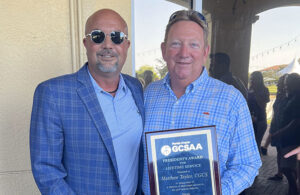Looking for a fixer
At a time when equipment managers are scarce, educators are working to trumpet the profession
Ken Mullin launched his career at Skagit Golf & Country Club in Burlington, Wash., 37 years ago, working on the grounds crew. But he was a talented mechanic, and it wasn’t long before he moved into that role at the club.
Now, all these years later, the 66-year-old Mullin figures he’ll retire in a couple years. That leaves Skagit superintendent Steve Link two years to find and train a suitable replacement.
And it won’t be easy. Throughout the country, superintendents are faced with an aging work force of trained mechanics, technicians and equipment managers who are nearing retirement. Filling their positions may be difficult, but it also creates an opportunity to bring new, skilled talent into the golf industry.
The ideal candidate
“We value Ken’s work and want him here as long as he wants to be here,” Link says. “We’re trying to plan for his eventual replacement so there’s not a lapse in quality for our members.”
Link plans to hire an apprentice who can work under Mullin and learn from him before taking over. The ideal candidate will understand mechanical skills and small engine repair, even if he doesn’t understand the golf course maintenance world.
“Between myself, the assistant superintendent and Ken, we could cultivate this person and train him to the standards we want involving golf course equipment as it differs from just regular automotive repair,” Link says.
Link’s plan is for the apprentice to start on the grounds crew while acquiring the technical skills needed to service and maintain equipment. “I want someone to have the knowledge of what each job is like so they know how the equipment is used, and how it can be abused, or what kind of quality concerns we’re looking for,” he says.
Rising through the ranks
While in training, the apprentice will be paid $13 an hour for three months, $14 an hour for three months and $15 an hour for another three months. Ideally, Link says, the apprentice will eventually become an equipment manager who will not only maintain equipment but also organize schedules and track usage, earning about $45,000 a year.
Class A members of the International Golf Course Equipment Managers Association (IGCEMA) make an average salary of $50,000 a year, says IGCEMA President John Patterson. And according to the job website SimplyHired.com, the annual salary for a golf course equipment manager ranges from $30,000 to more than $100,000 a year, depending on skill and budget.
The challenge for Link is finding the right person to replace Mullin. He thought he’d found someone — a guy who worked for a local tractor maintenance company — but that fell through. Now Link plans to reach out to his members, some of whom are local business owners who can help with the search. Still, it could take a year to find someone who has the right personality and ability for the position.
Coming up short
If Link is having a hard time finding a replacement for Mullin, it may be due to the shortage of turf equipment managers out there. Many mechanics don’t even know working at a golf course is an option for someone with their skills. The game’s tranquility is to blame for that, says George Klein, an instructor at Walla Walla Community College in Walla Walla, Wash.
“Golf courses do a good job of making the game peaceful, and to be peaceful, you don’t want to see or hear mowers,” Klein explains. “You don’t want to have unsightly things, so they hide the maintenance facility.”
And because crews tend to mow at night or early in the morning, no one sees them working on the job. “We’ve done a spectacular job of hiding what it takes to manage a golf course from the public,” Klein says. “Because you’re neither seen nor heard, you don’t exist. If you don’t exist, you don’t need technicians.”
John Piersol, the executive director of Industrial and Agricultural Programs at Florida Gateway College (formerly known as Lake City Community College) in Lake City, Fla., agrees, saying students have never heard of the career.
“How many students come out of high school saying, ‘I want to be a turf equipment technician?’ he says. “It’s difficult to describe or get somebody interested in a career they know nothing about. Most people don’t understand why a golf course would have a need for a mechanic because they don’t work on a golf course.”
Florida Gateway College offers a one-year certificate in turf equipment technology, but due to low enrollment in the program, the college suspended operation of it in February to consider modifying it. The program had run continuously for 40 years, says Piersol.
“We need to develop new strategies to recruit for turf equipment, which might entail changing the program format,” he says. Right now, he adds, “I cannot recruit enough students into the career of turf equipment technician to continue to run the program.” It’s substantial news for what Piersol says is the longest-running turf equipment program he knows of in the country.
Still strong is the college’s two-year program for an A.S. degree in golf course operations, with graduates entering the market as assistant superintendents.
The shortage of turf equipment technicians throughout the country may also be due to the scant number of programs in the U.S. that actually teach the trade. Several programs cover small equipment repair, but Florida Gateway College and Walla Walla Community College might be the only ones focusing specifically on golf course equipment repair — and now one of them’s suspended.
Going online
To broaden the reach of its program outside Walla Walla, a city of fewer than 40,000, Klein thought of an innovative way to train more technicians — online.
While students may come to the campus to learn, they don’t have to. Online students attend classes via computer. They have a textbook, watch videos and participate in message boards with classmates. To give them hands-on experience, students are required to have a mentor. This usually is accomplished when the student already works in a hands-on situation.
“They’re employed someplace like a golf course, a dealership — somewhere they have access to a shop,” Klein says. “You can’t learn to be a technician without doing.” Since Klein began the online program four years ago, the college has trained equipment technicians in Virginia, Idaho, Washington and Oregon. Klein even had two students take the course from Hong Kong. On average, Walla Walla graduates six students a year from the program.
Need to be heard
Piersol and Klein recommend the golf industry reach out to the public, particularly high school students, to educate them about equipment technician career opportunities. They suggest superintendents talk to kids in shop class and in Future Farmers America clubs and invite them to tour the golf course and the maintenance facility stocked with about $1 million-worth of precision equipment.
“If a local golf course invited them to the maintenance facility, let them see for themselves, especially someone with mechanical aptitude,” Piersol says. “You wouldn’t have to say a thing. They’d get it.”
More than meets the eye
There’s a lot more to the career than just making repairs, Piersol says.
“The equipment manager is the team psychologist,” he explains. “Don’t we act like the space that we’re in? If it’s a dirty, nasty space, that’s how the crew will feel. You can change the whole psychology of the team. He sets the tone for how people feel when they come to work every day.”
The job also offers autonomy not often found in other technical careers.
“It’s almost like you’re your own boss, because the superintendent will leave you alone,” Piersol says. “At a lot of auto shops, or other kinds of jobs, you’ve got a sharp manager barking at you. (This is) a pretty nice job.”
In fact, the technician’s job is a crucial part of the game, Klein says.
“An operator can drive a straight line, but if the machine isn’t adjusted properly, sharpened, or ground properly, the after-cut appearance won’t look good,” Klein says. “It’s what the technician did in the shop to set up the machine properly that gives you the after-cut appearance.”
After almost four decades on the job, Mullin knows that well.
“When the fairways, greens and tees are all looking good,” he says, “you know the mechanic’s accomplished something, because the mowers are cutting good. That’s when you feel like you’ve accomplished something.”
Stacie Zinn Roberts is president of What’s Your Avocado?, a writing and marketing firm based in Mount Vernon, Wash.










